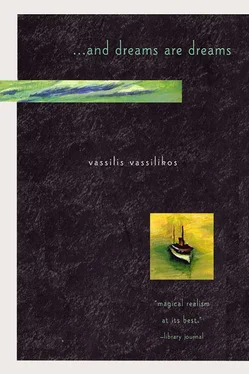“And indeed, he convinced the American
government to buy a frigate for Greece. All this happened incredibly quickly, within only ten days. As Kontostavlos put it, ‘The committees concerned made the decisions and Congress voted on them.’ At last, Greece acquired a frigate, which was named, naturally, Hellas . It arrived in Nafplion in 1826, and there was much celebrating. But in August 1831, exasperated by the antics of the killer, Captain Cochrane, Miaoulis blew it up in the port of Póros.”
On deck, the discussion between these “Greek residues,” as the captain thought of Elias’s friends, continued. But the captain was deep in his own thoughts. From the time when he was a grandson himself and he would ask questions of his own grandfather, an old sea wolf from Hydra, he came back to his present body, now the age his grandfather had been and with grandchildren of his own. The yacht pulled up anchor, leaving behind it the smoke-filled sky. One could guess at the fires raging behind the mountains of Argolis. Again this year, as it happened every summer, Greece was in flames. Fires
everywhere, singing the praises of its pyromaniac God.
“I imagine a modern Kontostavlos,” said the captain to himself, “going to America to negotiate the position of American military bases. Where could he find the courage to hope that by sending away the bases something would change in this world governed by a network of superpowers, where the departure of one only means the penetration of another? Where is freedom today? Which independence is guaranteed and by whom? The nonaligned countries? The socialists?
Nowadays the only ones brave enough for these heroics are the desperate. Those who have nothing to lose but their lives. And these are the kinds of people who fought the War of Independence. ‘Better one hour of freedom….’ But nowadays, when we know that no one in power will concede anything without getting something in return, informed as we are about what is happening everywhere on our planet, and given the complexity of the contrasting interests of east-west, north-south, metropolis-periphery, what else counts besides the struggle, the myth of Sisyphus? And yet that poor old Greek, Kontostavlos, kept hoping and fighting with beautiful illusions. That was his grandeur. That was his beauty.
“And afterwards? There is no afterwards. Along comes Capodistrias. A competent diplomat of international acclaim. He contributes money from his own pocket, ‘from his very modest fortune,’ so that he will not be accused of holding office just to make a bundle. But he too comes from Geneva. Just like that outrageous general and ‘master builder’ of the disaster of Asia Minor, Hatzianestis, who had come from Geneva. In general, the saviors of the nation always come from abroad. Usually from Paris or London.
We’re talking about the democratic saviors, because the others, the royalists, were all German. Starting with King Otto. But the democratic ones (Venizelos, Karamanlis) came from France or francophone Switzerland, which is where they return when the Greeks send them away, as in the case of Plastiras. But what is the connection between Switzerland and what the young people were talking about on deck a moment ago — Greeks and their Swiss bank accounts?
Was it perhaps the philhellene Swiss banker Eynard who started it? Is it perhaps the banks that govern? The cash register, as the captain’s old boss, the arms dealer Bodossakis used to say? And what about posthumous fame? Could money buy that also? If you’re smart, you’ll grease the palm of those who form public opinion. That way, when Bodossakis (who had made his first crisp dollar bills selling bullets to Franco) kicked the bucket, nobody said a word, the almighty pens laid low, and they passed him into history as an archetype, ‘the man behind the scenes.’
“But there was not a single one among the mighty pens who had not received something extra. These tips were sent, even to those who did not want them, by the deceased, may he be happy where he is now, in the next world, in the company of Capodistrias, who was sent there before his time by the bullets of Petrobey Mavromichalis and his men.
“No, from the beginning, this land was not meant to progress. It was written in its cells.” As he stood, the captain thought of a time in the past, of frigates and schooners, in this lake, which is enclosed by Hydra, Porto Heli, and the mountains of Argolis in flames. It was on a night like this, “a night full of wonders, a night strewn with magic,” when the fate of the war was decided, at the naval battle of Navarino. Because it is we who make history go forward, not history that makes us go forward. history is a wheel in the universe that man has to set in forward motion. Otherwise, it just stays a wheel, an eternal wheel, and everything moves backward.
“I wouldn’t know what to say,” the old captain thinks, “but even if I did, I wouldn’t say anything more than the everyday things I say, because wisdom is keeping your mouth shut, putting a lid on a lot of facts, because you know that providing information is not always a good thing. It can become a weapon in the hands of the enemy and you, remember this, are nothing but a little bug in the wheel of time.”
The group on deck was now disagreeing about where they’d moor for the night. Finally, they agreed on Spetses.
“Is there a fire there?” asked Elias.
“Not that I can tell,” answered the young captain.
But then they remembered that the steward had taken the dinghy to go visit his mother and wouldn’t be back until daybreak, so they did not weigh anchor after all.
Irini and Fiberglass were still discussing ways of losing weight. Plasterboard was still arguing with Aristotle. The doctor, Persephone, the American, and Elias had started playing cards. And only Arion’s guitar accompanied the sleepless moon.
Again the captain went back in time. He put his ear to infinity. Alone on the bridge, he was being chased by a ghost, that of Capodistrias. He would not have been angry with the governor had he not put his compatriots under quarantine at that precise moment, using the pretext of the plague that had spread on his island of Hydra, brought by Ibrahîm’s army, just like the English liberators after the German occupation had brought syphilis with their colonial soldiers. “The English,” he thought to himself, “the English fought us more than the Turks.” Because, in his mind, his great-grandfather was connected to the figure of the governor, but in a negative way.
— 3-
The Narrator
The narrator, this person who is outside our story, outside the cruise, but thanks to whom we are informed about what was going on on the yacht and in the mind of the captain, was reading page fifty-seven of The Political History of Modern Greece by Spyros Markezinis. “Since they [the government] were unable to deal with this difficult situation by soliciting loans from abroad — because, after the failure of the revolutionary loans, without a guarantee, neither could a compromise be reached concerning the previous loans, nor a new loan procured — and because naturally there was never any question of a national loan, there were only two other ancient solutions left: economizing (austerity) and an increase in state revenue (taxation). The former would have to be achieved without restricting military expenses, even after the battle of Navarino, because the danger of an attack by Ottoman troops was not out of the question, and also because immediate demobilization would create social problems (unemployment). The demobilized troops would become legends.”
He shut his book and went out. He wanted to go to a certain address he had been given where he could get his dose from a dealer called Elpiniki. Number 11
Читать дальше












